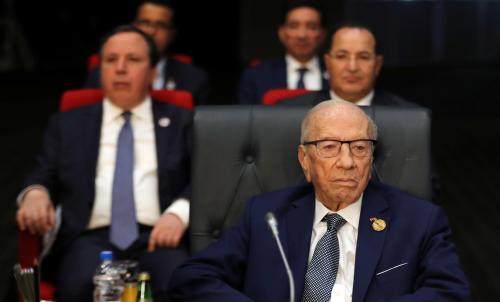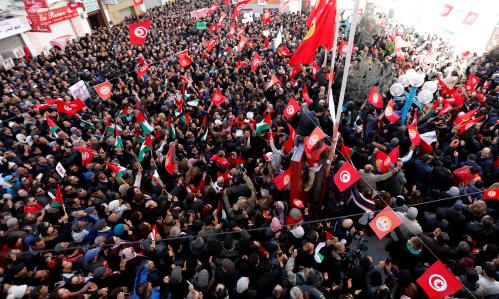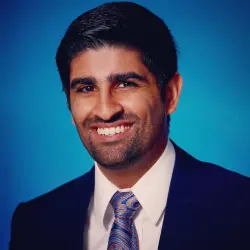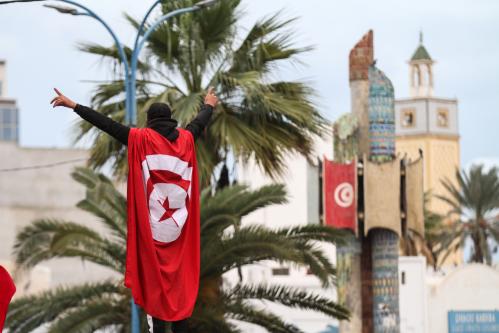Tunisians headed to the polls on Sunday in their second free and fair presidential election. The election was exceptionally competitive, with no candidate in a crowded field of 26 garnering more than 20% of the vote. Official results will be released on Tuesday, but exit polls by both Sigma Conseil and Emrhod Consulting point to a shocking victory for two political outsiders: Kaïs Saïed and Nabil Karoui. The two will likely face off in a still-to-be-scheduled second round.
The (still unofficial) victory of Saïed and Karoui, both relative newcomers, handed a sharp rebuke to the ruling coalition, represented by Prime Minister Youssef Chahed, Defense Minister Abdelkrim Zbidi, and parliamentary speaker Abdelfattah Mourou. But the electoral defeat of the political establishment was a long time coming.
An anti-system vote
As I argued in February, the conditions in Tunisia were ripe for the emergence of populist outsiders. Eight years into the Arab Spring, Tunisia’s successive governments had failed to deliver on the primary demand of the revolution: economic opportunity. By almost every metric, the economic situation was even worse than that which led to the 2011 revolution. Unemployment, roughly 12-13% pre-revolution, had jumped to 18% in 2011 and remains at 15% today. Inflation, 3-4% pre-revolution, has doubled to 7%. The rate of economic growth, around 5% pre-revolution, struggles to reach 2% today.
These difficult economic conditions have contributed to frustration with not just the ruling parties but the entire political system. The 2014 constitution established a semi-presidential system where executive power is shared between the president and the head of government, a divided system that has produced five years of slow governance and compromise solutions. Meanwhile, perceptions of corruption have risen, and support for democracy has declined.
Varieties of populism
Both Kaïs Saïed and Nabil Karoui were able to capitalize on this frustration, though in very different ways. By April 2019, both were leading in the pre-election polls.
Kaïs Saïed, 61, appeals to disillusioned youth by promising a new system: one in which power will be more decentralized, “so that the will of the people reaches the central power and puts an end to corruption.” Saïed, a constitutional law professor at the University of Tunis, is proposing sweeping constitutional reforms, including empowering Tunisians to recall their parliamentarians. Claiming that the “era of parliamentary democracy is over,” he has also proposed abolishing parliamentary elections in favor of a “bottom-up” approach where parliamentarians will be chosen from elected local councils.
Through these structural reforms, Saïed hopes to bring power back to the people. Saïed taps into popular frustration that the 2010-11 revolution was “hijacked” by corrupt political parties. In that sense, he is a “populist,” railing against the political elite in favor of the people. And he has the credibility to make such a claim: He has never held political office, has no political party, and had never even voted before Sunday. He is a political outsider par excellence, giving him the integrity to mount a populist challenge.
Beyond his agenda, the appeal of Saïed is his person. An intellectual, Saïed first caught the public eye during the drafting of the 2014 constitution, when he repeatedly appeared on state TV explaining complex legal debates in a monotone, classical Arabic — a robotic delivery that earned him the nickname “Robocop.” His ascetic personality — taking public transportation, pledging to continue living at home instead of the presidential palace — also evokes an image of an honest man, one that will not be corrupted by power.
Nabil Karoui, by contrast, who came in second in Sunday’s vote, taps into a related yet distinct strain of populism. Karoui, 55, is a media mogul who co-founded Nessma TV alongside Silvio Berlusconi. Despite his wealth, Karoui pitches himself as a champion of the poor and “forgotten” Tunisians, a reputation he has cultivated by hosting a charity show, Khalil Tounes, since 2017 (he stopped hosting it in June in accordance with electoral regulations). Karoui promised a “revolution at the ballot box” in favor of the “other Tunisia” — the millions neglected by the establishment. In contrast to Saïed’s decentralized state, Karoui implicitly promises a strong state that can restore economic growth and deliver goods and services to the people.
While a newcomer in running for office, Karoui is no political novice. His TV station, Nessma TV, took a very political tone in criticizing the Islamist party Ennahda during the 2011-13 troika government. Karoui then co-founded the Nidaa Tounes party alongside the late president Beji Caid Essebsi, and allegedly used his TV channel to aid Essebi’s candidacy in the 2014 elections. While he therefore has political experience, he is still able to present an image of a political outsider having never held political office.
As Karoui began to rise in the polls, the establishment parties seemed to band together to weaken his candidacy. In June, the parliament approved amendments to the electoral law that would have barred Karoui from running, but these were never signed by the late president Essebsi. Karoui has since been arrested and imprisoned on charges of tax evasion and money laundering, preventing him from campaigning or appearing in the country’s first televised presidential debates. While the charges against him may be valid— they were filed back in 2016 by the Transparency International-linked group I-Watch— the timing of his arrest has politicized the charges, and allowed the Karoui campaign to capitalize on them. Describing Karoui as Tunisia’s first political prisoner since the revolution and likening him to Nelson Mandela, the Karoui campaign used his imprisonment to garner sympathy and feed into a broader narrative of Karoui being an outsider victimized by the establishment.
Saïed and Karoui represent two almost diametrically opposed forms of populism.
In short, Saïed and Karoui represent two almost diametrically opposed forms of populism. Saïed’s intellectual nature and “power to the people” agenda appeals to a younger, more educated crowd, especially disillusioned revolutionaries. Indeed, exit polls by Sigma Conseil suggest that he performed best among individuals with a college degree and young, first-time voters. Karoui, by contrast, performs well among ex-Nidaa Tounes voters as well as poor, rural voters, especially who have benefited from his charity program. Exit polls suggested Karoui won nearly 41% among voters with no formal education, and 30% with voters with just a primary education.
The establishment: Down but not out
While the election results are a major upset for the establishment, they also provide important lessons for it moving forward. The establishment had been considerably divided heading into the polls, creating an opportunity for outsiders to claim both spots in the run-off.
No fewer than six candidates campaigned for what we can term the “secular establishment” — the progressive, modernist camp originally affiliated with the late president Essebsi’s Nidaa Tounes party. These candidates included Prime Minister Youssef Chahed, Defense Minister Abdelkrim Zbidi, former presidential chief of staff Salma Elloumi Rekik, and former prime minister Mehdi Jomaa. The endorsement of Zbidi by Mohsen Marzouk and Slim Riahi was a start, but nowhere near enough to unite this camp. As Chahed himself as noted, these parties will need to join forces if they hope to perform well in the October 6 parliamentary elections.
Perhaps the largest surprise in this election was the poor performance of Ennahda, the Islamist party that has played a role in every elected government since the 2011 revolution. Observers regularly speculated that Ennahda’s electoral machine could routinely churn out 20-30% of the electorate, yet Ennahda’s candidate Abdelfattah Mourou won only 11% on Sunday. If their poor performance is repeated in the parliamentary elections, and if their leadership decides that its many compromises on the role of religion and on the goals of the revolution are to blame, this defeat could have major implications for how the party positions itself moving forward.
The road ahead
The run-off election between Kais Saied and Nabil Karoui will be scheduled for either September 29, October 6, or October 13, depending on the number of appeals from the first round. But the road ahead is uncertain: Karoui remains in prison, and if he is found guilty before the second round (unlikely, but possible), he would be replaced by the third-place candidate, Ennahda’s Abdelfattah Mourou. If not, Karoui could gain immunity if he were to win the presidential election.
If the run-off features Saïed and Karoui, a critical predictor of how each will perform will be who the losing parties endorse. Saïed, socially conservative and relatively pro-revolution, may appeal to Ennahda voters, while Karoui, anti-Islamist and ex-Nidaa Tounes, may appeal to the secular establishment. With neither Saïed nor Karoui gaining more than 20% of the vote in the first round, gaining the support of other parties and candidates will be crucial for getting to 50%.
At least under the current constitution, the October 6 parliamentary elections are ultimately more important than the presidential ones, as the prime minister — the stronger of the two executives — derives his or her power from the parliament. That campaign has already begun, but notably Kais Saïed will be absent. Without a party, he will have no direct representation in the parliament. Karoui’s newly-formed party, Qalb Tounes (Heart of Tunisia), by contrast, had been leading the pre-election polls for parliament. With two more elections in the coming weeks, Tunisia’s political earthquake may be just beginning.






Commentary
Political outsiders sweep Tunisia’s presidential elections
September 16, 2019